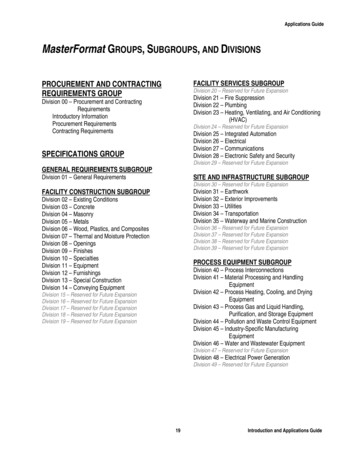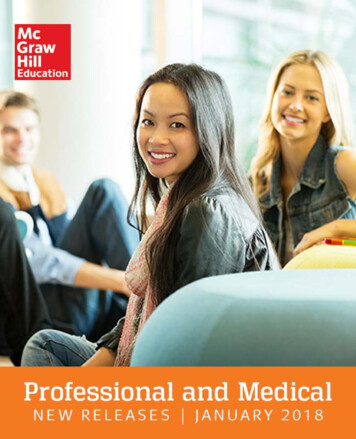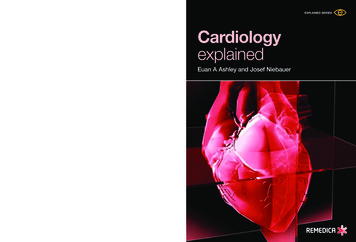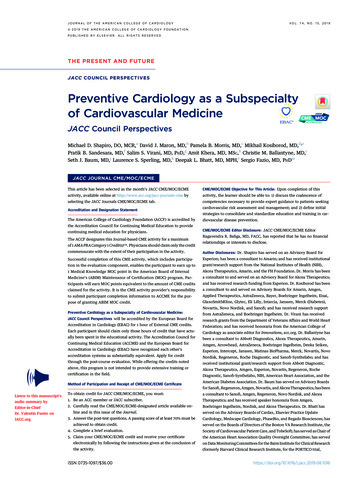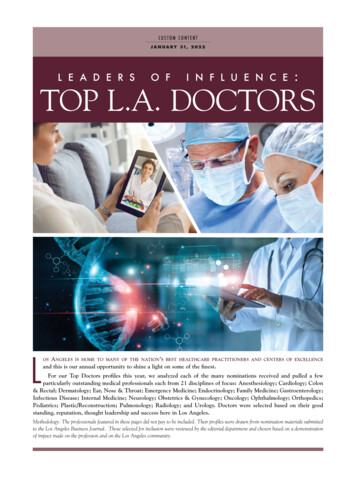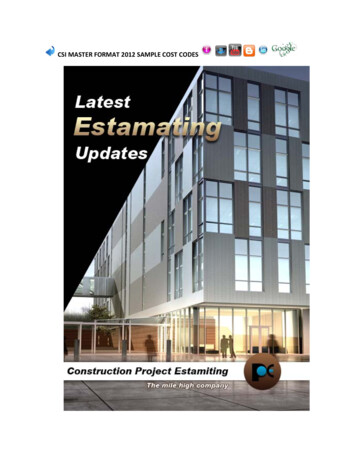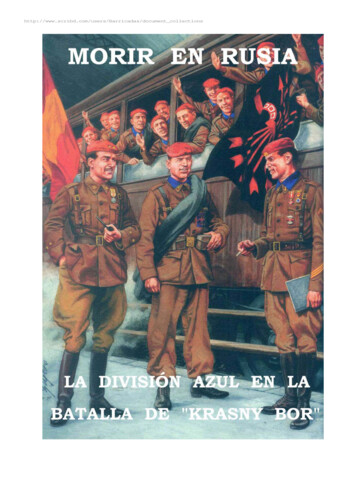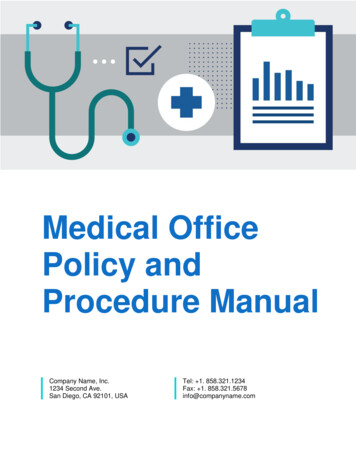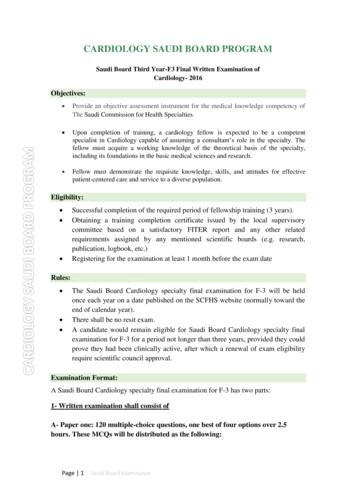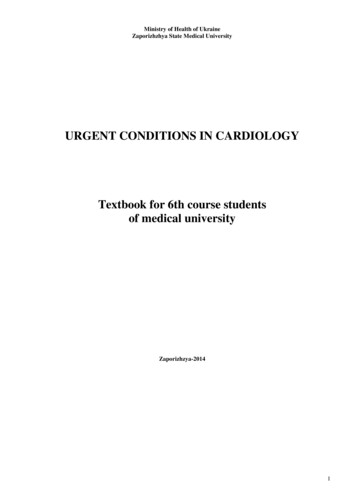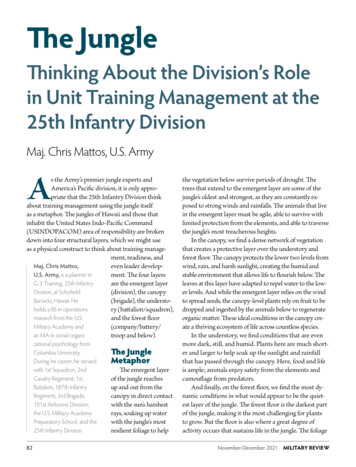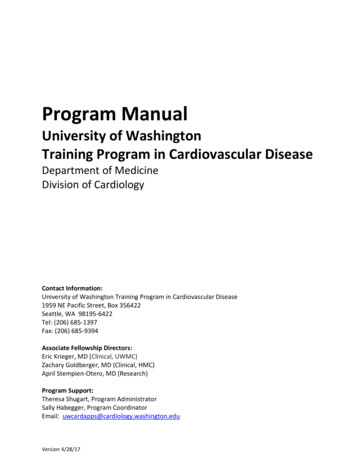
Transcription
Program ManualUniversity of WashingtonTraining Program in Cardiovascular DiseaseDepartment of MedicineDivision of CardiologyContact Information:University of Washington Training Program in Cardiovascular Disease1959 NE Pacific Street, Box 356422Seattle, WA 98195-6422Tel: (206) 685-1397Fax: (206) 685-9394Associate Fellowship Directors:Eric Krieger, MD (Clinical, UWMC)Zachary Goldberger, MD (Clinical, HMC)April Stempien-Otero, MD (Research)Program Support:Theresa Shugart, Program AdministratorSally Habegger, Program CoordinatorEmail: uwcardapps@cardiology.washington.eduVersion 4/28/17
UNIVERSITY OF WASHINGTON SCHOOL OF MEDICINETRAINING PROGRAM IN CARDIOVASCULAR DISEASEOverviewThe UW Fellowship Training Program in Cardiovascular Disease is an ACGME-accreditedprogram designed to prepare trainees for a career of excellence in Cardiology research andscholarly work, teaching, and patient care. There are seven (7) trainees accepted into ourprogram each year. Application to our training program is made via the ERAS online applicationsystem. All positions are filled via the National Residency Match Program. Cardiology traineesare recruited to a standard ACGME fellowship training track. Cardiology trainees begin theirfellowship with a core curriculum comprising 2 years of clinical training with rotations ininpatient cardiology, cardiac catheterization, echocardiography, nuclear cardiology,electrophysiology, adult congenital heart disease, heart failure and transplantation, cardiacconsultation, coronary care ICU, mechanical circulatory support, and ambulatory cardiovascularcare. Year 3 of training allows trainee differentiation into one of three pathways, dependent oncareer goals, the Clinician Scholar pathway, the Clinician Educator pathway, and the ResearchScholar pathway. Research is an integral part of our fellowship training program, withdedicated research time provided in the third ACGME year of training for all pathways. Traineesin the Clinician Scholar pathway complete an integrated 3rd year of advanced clinical andscholarly work, including clinical quality improvement initiatives. Trainees in the ClinicianEducator pathway complete an integrated 3rd year of advanced clinical and research training,with additional focus on mentored teaching activities and development of curricular materials.Trainees accepted to the Research Scholar pathway complete a 3rd and 4th year of training inresearch in basic sciences, health services, population science or clinical investigation under theguidance of a research mentor.PrerequisitesPrerequisites include completion of an ACGME accredited three-year residency in internalmedicine from a U.S. based training program, outstanding clinical skills, and demonstration ofprior research interest and experience. Because of the critical role that research training playsin the formation of future academic cardiologists, close attention is paid by the fellowshipselection committee to applicants’ aptitude for and experience in research. Moreover, allfellows are expected to conduct substantive research during their fellowship training, withpresentation and publication of the results of their work.Version 4/28/172
Fellowship Clinical Training SitesFellows rotate through four affiliated University of Washington Hospitals. UW Medicinehospitals and programs consistently rank highly in U.S. News and World Report’s annual “BestHospitals” issues.The University of Washington Medical Center (UWMC) is a 450-bed hospital with a 46-bedmedical/surgical critical care center. Cardiovascular services at the University of WashingtonMedical Center include specialized clinical teams in cardiac catheterization, echocardiography,clinical electrophysiology, advanced heart failure and cardiac transplantation, nuclearcardiology, advanced cardiovascular imaging, adult congenital heart disease, and cardiothoracicsurgery.Harborview Medical Center (HMC). HMC is a is a 413-bed hospital with a 63-bed critical carecenter owned by King County and managed by the University of Washington. Harborview is aworld-renowned Level 1 adult and pediatric trauma center. Cardiovascular services include anactive coronary care unit service, cardiology clinics and consultation service, echocardiography,and cardiac catheterization laboratories.Version 4/28/173
Seattle Veterans Affairs Medical Center (VAMC) has 268 beds with 82 beds assigned to themedical service, including 18 medical intensive care/coronary care unit beds. The cardiologyservice at the VA Medical Center maintains an active cardiac catheterization laboratory,inpatient and outpatient clinical cardiology, electrocardiography, and echocardiographyservices.Northwest Hospital & Medical Center (NWH) is a full-service community hospital, with 281beds, located just north of Seattle. A full-service community hospital, is located just north ofSeattle. The cardiology service at NWH offers elective rotation experience in cardiaccatheterization, cardiac rehabilitation, and peripheral artery disease management.Version 4/28/174
Clinical TrainingYear 1 and year 2 clinical rotations are scheduled over a consecutive time period (4 weekblocks, 13 blocks each year):Year 1Cardiology A UWMC (general inpatient cardiology wards)Cardiology B UWMC (heart failure/transplantation inpatient cardiology wards)UWMC echocardiographyHarborview inpatient cardiology consultation/cardiac catheterizationHarborview echocardiographyVAMC inpatient cardiology consultationVAMC cardiac catheterizationIntermittent overnight call for specialty consult services, cardiac procedures, inpatient servicesAmbulatory continuity clinicYear 2Cardiac intensive care unitUWMC advanced echocardiographyUWMC electrophysiologyUWMC inpatient cardiology consultationUWMC nuclear cardiologyUWMC adult congenital heart diseaseUWMC cardiac catheterizationIntermittent overnight call for specialty consult services, cardiac procedures, inpatient servicesAmbulatory continuity clinicYear 3Cardiac intensive care unitUWMC mechanical circulatory support consultation (VAD)UWMC junior attending general inpatient Cardiology wardsAdvanced subspecialty electivesIntermittent overnight call for specialty consult services, cardiac procedures, inpatient servicesAmbulatory continuity clinicElectives (offered during Year 3 unless otherwise specified)Research elective (year 2)Advanced imaging (intraoperative echo, CT/MRI, advanced echocardiography)Adult congenital heart diseaseHeart failure/MCSNuclear Cardiology (advanced training for Nuclear boarding)Advanced ElectrophysiologyAdvanced cardiac catheterizationCritical care cardiology night floatClinical quality improvementVersion 4/28/175
Teaching Conferences1.Division of Cardiology Grand Rounds on Fridays from 7:30 to 8:30 AM (September –June). Grand Rounds include at least 1 research conference per month, regular clinicalpathologic correlation conferences, and topics of clinical interest. Each fellow presentsat least once with other presentations by Cardiology faculty, faculty from relateddisciplines, and visiting speakers.2.Cardiology Tutorials on Fridays from 8:30 to 9:30 AM. (All year, with conferences from7:30 to 9:30 AM during the summer when Grand Rounds are not held.) Cardiologytutorials provide a comprehensive introduction to cardiovascular disease with emphasison pathophysiology, pathology, pharmacology, diagnostic imaging techniques, andresearch methods. Tutorials are scheduled by the Fellowship Program Administratorand Fellowship Program Assistant, and are coordinated with systematic readings from amajor cardiology textbook.3.Cardiac Multi-Disciplinary Clinical Case Conference, Wednesday’s, 7:30 to 8:30 AM,weekly, with collaboration of Cardiology, CT-Surgery and Cardiac Anesthesia in thesediscussions. The cases and background information are presented by the CardiologyFellows on a rotating schedule.4.Journal Club is a monthly dinner meeting arranged by the Cardiology Fellows. Fellowspresent recent journal articles of general interest, describing the content of the articleand directing a brief discussion of its strengths and weaknesses. All fellows are stronglyencouraged to pre-read the selected articles and provide an interactive dialogue oncurrent cardiology topics. Attendings with an interest in the area of the articles areinvited to share their perspective and experience.5.Fellows’ Research Conference is held once monthly. Fellows present ongoing work in avenue that is relatively informal, non-threatening, and interactive. Constructivedialogue and questions are encouraged and suggestions regarding research directionsand approaches are solicited from the attendees. Presentations are forward-looking,including presentation of new hypotheses as well as plans for acquiring grant fundingthat would allow the hypotheses to be tested. A Faculty Research Conference also ispresented monthly. Opportunities for collaborative work are emphasized andsuggestions for fellow involvement in faculty projects are particularly welcome.6.Fellows may attend other conferences, such as Cardiovascular Biology Breakfast Cluband Medicine Grand Rounds, as their rotations and schedules allow.7.Subspecialty weekly conferences in a variety of areas of expertise such as multimodalitycardiac imaging, interventional Cardiology, electrophysiology, and heart failure andcardiac transplantation, and adult congenital heart disease. Fellows are encouraged toattend as their schedules permit. Participation in various didactic courses, CME coursesand lecture series are encouraged as long as they do not interfere with other requiredassignments and clinical duties.Version 4/28/176
8.Other lectures/conferences scheduled throughout the year by the Department ofMedicine and School of Medicine. In addition, fellows are encouraged to attend onenational scientific meeting annually. Partial support for travel is provided. Conferencesare regularly scheduled including topics such as: OSHA and radiation safety regulations,continuous quality improvement, risk management9.Fellows on VAMC rotations participate in the weekly Friday VAMC CardiologyConference and fellows on HMC rotations participate in the first/third Fridayconferences at HMC.10.Fellows are encouraged to attend the Ethics in Medicine lecture series.Version 4/28/177
Research TrainingThe University of Washington is one of the largest, best supported, and most productiveresearch universities in the world. Cardiology fellows have access to a broad spectrum ofoutstanding research training programs at the University of Washington Medical Center and ataffiliated institutions such as Harborview Medical Center, the VA Puget Sound Medical Center,the Fred Hutchinson Cancer Research Center, the Puget Sound Blood Center, the Institute forSystems Biology, and the Northwest Lipid Research Laboratory. Research opportunities areavailable in laboratory-based, clinical, and population-based research. Many of our fellowspursue research training under the guidance of a member of the Cardiology Division. However,collaborations with investigators outside of the division are also common. Research is anintegral part of the UW Fellowship Training Program in Cardiovascular Disease, with dedicatedresearch time provided in the third ACGME year of training for all pathways. All fellows areexpected to conduct substantive research during their fellowship years and publish the resultsof their work. Research is a critical component of our program, preparing trainees for a sciencebased career such as modern medicine and is consistent with the recommendations of the CoreCardiology Training Statement (COCATS 4). In addition, the ACGME requires that all accreditedCardiology training programs: Ensure a meaningful, supervised fellowship research experience with appropriateprotected time.Provide fellows with training in the design and interpretation of research studies,responsible use of informed consent, research methodology, and interpretation ofdata.Ensure that fellows are advised and supervised by faculty members who are proficientin the design and conduct of research.Version 4/28/178
Year 1 trainingFellows meet with the Associate Program Director for Research, to define research interestsand explore opportunities. By the end of the first year, fellows identify a faculty researchmentor and begin discussion of possible research projects. Fellows with an interest in theResearch Scholar pathway should apply to this program by the end of the first year.Resources: University of Washington faculty and departmental web sitesFellowship program manual and websiteFaculty, including Drs. Rosario Freeman, April Stempien-Otero, Francis Kim,David DichekTimeline:: July-December: Fellow researches potential projects/mentors, shared areas ofinterest either clinical or research. In consultation with fellowship directors,fellows select a research planning adviser. Fellows should have a short list ofpossible topics/projects (can be a stand-alone project or part of a larger projectcarried on by the research mentor). January: Associate Director for Researchmeets with fellow to help identify research and career goals. A list of potentialresearch mentors is formulated. Meetings with potential mentors scheduledover the next few months.Year 2 trainingFellows are able to schedule a research block elective to initiate work on their research project.By May 1 (preceding start of second year), fellows update their Individualized DevelopmentPlan and submit a research proposal with their mentor's commitment to work with them. Thisproposal should include a summary of the research project, the specific research activities thatare planned during the research month, and anticipated scholarly work (paper, chapter, grantapplication), signed and agreed on by the research mentor.Year 3 trainingClinician Scholar pathway: Trainees complete an integrated ACGME 3rd year of advanced clinicaland scholarly work, including clinical quality improvement. Fellows choose a faculty mentorduring the first year and are provided clinical quality improvement/research blocks during thethird year of fellowship training. Scholarly work and clinical research are focused within thearea of subspecialty interests. Clinical rotations in this pathway include core rotations inspecialized inpatient consultation and critical care. Additionally, advanced clinical subspecialtyelective time is provided.Requirements Year 3 Clinician Scholar pathway:1. Clinical training time during the year 3 fellowship training includes: specialized inpatientconsultation and critical care rotations, advanced subspecialty clinical electives,maintenance of a weekly continuity clinic and intermittent overnight call for specialtyconsult services, cardiac procedures, inpatient services.2. Individual Development Plan (IDP) initiated in year 1. The IDP is updated and discussedwith the program director/faculty at semi-annual and annual evaluation meetings toclarify short and long-term academic and career goals.3. Complete a substantive, in-depth clinical quality improvement project under thementorship of a faculty member. Fellows will submit a project proposal with theVersion 4/28/179
4.5.6.7.mentor's commitment to work with them which includes a summary of the project, thespecific investigative activities that are planned, and anticipated scholarly work(protocol, publication, intervention, meeting submission), signed and agreed on by boththe fellow and faculty mentor. Approval by program director is required.During year 2 training, fellows will be provided an option for a quality improvementelective to begin their project. Fellows committed to a clinical research project will alsoassess the need for Human Subjects approval for their projects, design data collectionforms, and develop a timeline for data collection and publication prior to completion offellowship training.Fellows present interim results of quality improvement projects at cardiologyconferences, submit clinical case presentations, and, where appropriate, submitabstracts/prepare manuscripts for presentation and publication. Faculty mentor shouldattend these presentations.Fellows present an in-depth clinical topical review at a UW Cardiology Grand Rounds inthe area of their specialty or subspecialty interest.Interested fellows may prepare grant applications to fund clinical research during Year 3of training. The program director and associate program director must be notified 6months in advance of this submission. For extramural grant funding applications, suchas the ACC or AHA, application to earlier funding cycles (award notification by winterpreceding funding period) is mandatory. In the rare case where application to a laterfunding cycle is needed, (award notification by the spring preceding funding period),fellows are subject to the clinical training schedule adjustment needed to meet thefunding requirements of the grant, which may delay the grant start date.Clinician Educator pathway: Trainees complete an integrated ACGME 3rd year of advancedclinical and research training, with additional focus on mentored teaching activities anddevelopment of curricular materials to strengthen educational skill sets and prepare the traineefor a career in academic cardiology, including development of a formal teaching portfolio.Trainees choose a faculty mentor during the first year and are provided protected scholarlywork development blocks during the third year of fellowship training. Teaching activities andcurricular materials are focused within the area of subspecialty interests. Trainees areexpected to teach in multiple clinical settings, and will receive feedback on teaching skills.Trainees in this track participate as small group co-leaders for the UW Medical SchoolMedSci530 Circulatory Systems course. Clinical rotations in this pathway include core rotationsin specialized inpatient consultation and critical care. Additionally, advanced clinicalsubspecialty elective time is provided.Requirements Year 3 Clinician Educator pathway:1. Clinical training time during the year 3 fellowship training includes: specialized inpatientconsultation and critical care rotations, advanced subspecialty clinical electives,maintenance of a weekly continuity clinic and intermittent overnight call for specialtyconsult services, cardiac procedures, inpatient services.2. Individual Development Plan (IDP) initiated in year 1. The IDP is updated and discussedwith the program director/faculty at semi-annual and annual evaluation meetings toclarify short and long-term academic and career goals.3. Develop a teaching portfolioVersion 4/28/1710
4. Lead morning small group Cardiology A teaching sessions 10 sessions (each session is30 minutes). Feedback on teaching is provided.5. Teach as co-leaders of small group for the UW MedSci 530 medical student course alongwith a faculty mentor. Feedback on teaching is provided.6. Complete a substantive educational initiative or scholarly project under the mentorshipof a faculty member. Submit an education proposal with the mentor's commitment towork with them which includes a summary, specific activities planned, and anticipatedwork (protocol, materials), signed and agreed on by both the fellow and faculty mentor.Approval by program director is required. Options include:1. Develop/revise rotation-specific curricula2. Write teaching scripts for Card A/CCU/resident lecture series3. Manage specific rotation with attending4. Develop or revise an educational conference5. Create teaching materials for other educational initiatives within cardiology such asmedical student courses, resident rotation materials, simulated teaching activities6. Other novel approaches to education7. Complete a clinical quality improvement project under the mentorship of a facultymember. Fellows will submit a project proposal with the mentor's commitment to workwith them which includes a summary of the project, the specific investigative activitiesthat are planned, and anticipated scholarly work (protocol, publication, intervention,meeting submission), signed and agreed on by both the fellow and faculty mentor.Approval by program director is required8. During year 2 training, fellows will be provided an option for a quality improvementelective to begin their project.9. Fellows present interim results of education work or quality improvement projects atcardiology conferences, submit clinical case presentations, and, where appropriate,submit abstracts/prepare manuscripts for presentation and publication. Faculty mentorshould attend these presentations.10. Fellows present an in-depth topical review at a UW Cardiology Grand Rounds in the areaof their specialty or subspecialty educational interest.11. Interested fellows may prepare grant applications to fund clinical research during Year 3of training. The program director and associate program director must be notified 6months in advance of this submission. For extramural grant funding applications, suchas the ACC or AHA, application to earlier funding cycles (award notification by winterpreceding funding period) is mandatory. In the rare case where application to a laterfunding cycle is needed, (award notification by the spring preceding funding period),fellows are subject to the clinical training schedule adjustment needed to meet thefunding requirements of the grant, which may delay the grant start date.Research Scholar pathway: After completion of 2 years of core clinical curricular training,trainees who plan a significant research component in their careers spend a minimum of twoyears obtaining research experience designed to provide necessary tools in techniques ofinvestigator-initiated clinical, translational and/or bench based basic research. A commitmentto research training is required, with development of a detailed research plan coordinated bythe trainee, research mentor, program director, and Division Head. A clinical research scholarpathway provides trainees with the appropriate statistical background and expertise in clinicalVersion 4/28/1711
research methodology to succeed as a clinical investigator, utilizing formal coursework throughthe UW School of Public Health.Grant writing is an essential component of research career development for fellows aspiringto become independent investigators, and trainees in this pathway are required to apply forgrant funding. With the assistance of a faculty led mentoring team, competitive candidatesapply for grant funding early during year 2 of training. Extramural funding sources include AHAfellowships and individual NIH F32. Internal funding sources include NIH-sponsored researchtraining grants (T-32) for eligible candidates (US citizens or permanent residents) including theCardiovascular Research Training Program, the Palliative Care Research Fellowship, and theGenetic Approaches to Aging.After year 4, fellows who intend to become independent principal investigators inlaboratory-based, clinical, or population-based research may need to extend their researchtraining. Research mentors guide fellows whose aptitude and interest for research remain hightowards submission of faculty transition grants such as the NIH K08 or K23, and the AmericanHeart Association Scientist Development Grant or Fellow to Faculty Award. NIH KL2 awards,which provides 2 years of faculty-level salary support and a mentored training environment forfellows who wish to develop a career in clinical research are awarded through a competitiveprocess by the Institute of Translational Health Sciences (ITHS).Requirements Research Scholar pathway:1. Years 3 and 4 are devoted primarily to research under the guidance of a faculty mentorand mentoring committee. Clinical training time during year 3 of fellowship trainingmeets ACGME training requirements, and includes maintenance of a weekly continuityclinic and intermittent overnight call for specialty consult services, cardiac procedures,inpatient services. During year 3 of training, fellows are responsible for specializedinpatient consultation and critical care rotations, the specifics of which are dependenton stipulations of individual grant awards.2. Individual Development Plan (IDP) initiated in year 1. The IDP is updated and discussedwith the program director/faculty at semi-annual and annual evaluation meetings toclarify short and long-term academic and career goals.3. Fellows develop a mentoring committee by the end of year 1 and apply for researchfellowship grants during a second year research elective block elective. Currentinstitutional training grants support fellows working in basic and applied cardiovascularbiology, imaging, health care outcomes, bioengineering, and epidemiology. Externalfellowship grant applications are typically submitted to the American Heart Association,the American College of Cardiology, the National Institutes of Health, and otherprofessional societies, private agencies, or corporate foundations. Fellows must meetthe training and research time requirements of research awards.4. Fellows prepare grant applications to fund research beginning in July of Year 3 oftraining. For extramural grant funding applications, such as the ACC or AHA, applicationto earlier funding cycles (award notification by winter preceding funding period) ispreferred. In the cases where application to a later funding cycle is needed, (awardnotification by spring preceding funding period) fellows are subject to the trainingschedule adjustment needed to meet the salary funding requirements of the grant.5. Fellows are expected to complete a substantive cardiovascular disease research project.Version 4/28/1712
6. Fellows present interim results of research projects at cardiology research conferences,submit abstracts, and prepare manuscripts for presentation and publication. Facultymentors are required attend these presentations.7. Fellows present an in-depth review of their research work at UW Cardiology GrandRounds8. Fellows receive training in the scientific and practical “survival skills” that are requiredfor success as an independent investigator. These skills include writing manuscripts andgrants, speaking, biomedical ethics, financial management, job finding, and mentorship.Training in these areas is provided by formal courses and by the research mentors on aninformal basis. Research Scholars in epidemiologic and population sciences willcomplete Masters level training in these skills.Version 4/28/1713
Appointments/Stipends/BenefitsDetails of the Fellowship Position Agreement for the University of Washington are available llows/Pages/default.aspxAfter beginning training, most fellows will be reappointed to successive years of training, butthis is not binding upon either the fellow or the Program Director. A fourth year of researchtraining requires application or arrangement with the Research Scholars Program.In October of 2014, the University of Washington Housestaff Association (UWHA) was certifiedas the labor union and exclusive bargaining representative for the majority of residents andfellows in the UW School of Medicine (UW SOM) and in the UW School of Dentistry (UW SOD).The UW/UWHA Collective Bargaining Agreement was ratified November 1, 2016, and will be ineffect through June 30, 2019.The UW/UWHA Contract is available ociation/uwha-contractStipends are reviewed annually and determined at the Institutional level. The current UWresident stipend schedule is available 19.pdfThese salaries are adjusted annually. Medical insurance and basic life insurance are provided toall fellows and their dependents. Supplemental life insurance, disability insurance, andretirement benefits also are available. All Cardiology fellows receive three weeks of vacationper year.Fellows organize evening and weekend call schedules throughout the three years of training.On average, first year fellows are on-call an every 4th night/weekend and second/third yearfellows every 5th night/weekend. Cardiology fellows are entitled to staff privileges at theUniversity, including use of the library, and membership to the Intramural Sports ActivitiesBuilding.Although fellows in the general Cardiology training program are not concurrently trained forboard eligibility in subspecialty ACGME fellowships, the University of Washington Cardiologyprogram does offer subsequent subspecialty fellowship training in interventional Cardiology,electrophysiology, adult congenital heart disease, and advanced heart failure/cardiactransplantation. These fellowship programs require a separate application process, and arebetween one to two years in length, depending on the specialty.Version 4/28/1714
UNIVERSITY OF WASHINGTON TRAINING PROGRAM IN CARDIOVASCULAR DISEASEADMINISTRATIVE GUIDELINES 2017-2018Specific Guidelines for detailed University of Washington procedures and policies for fellowsare contained in the Fellowship Position Appointment Agreement, which each fellow receives.This contract provides for a variety of procedures, should they be needed, including emergencyor exceptional leave requirements, termination of contract, grievances, etc. The followingAdministrative Guidelines apply specifically to the Cardiology Fellowship Programs. Additionalinformation is also available at the UW Graduate Medical Education ospective-residents1. Administration Office and CommunicationAll questions regarding fellowship issues should be handled by the Fellowship Office.Fellowship Office Hours: Monday-Friday – 8:30AM – 5:00PMPhone/Voice mail: 206-685-1397Fax: 206-685-9394Email : uwcardapps@cardiology.washington.edu2. Evaluation of Clinical Performance and Documentation of ProceduresA des
major cardiology textbook. 3. Cardiac Multi-Disciplinary Clinical Case Conference, Wednesday’s, 7:30 to 8:30 AM, weekly, with collaboration of Cardiology, CT-Surgery and Cardiac Anesthesia in these discussions. The cases and background inf
